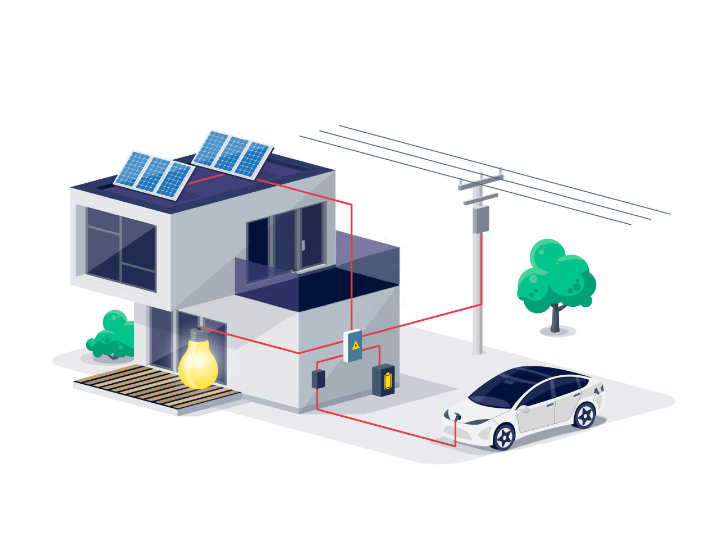The past few years have seen a significant push from the government towards the advancement of the photovoltaic industry, particularly favoring distributed photovoltaics. Forward-thinking individuals have capitalized on these national policies by installing photovoltaic systems on their rooftops. But what exactly are the advantages of having a photovoltaic power system installed at home? A thorough investigation reveals several benefits. Firstly, installing a photovoltaic system on your roof provides excellent heat insulation, reducing the need for air conditioning during summers and contributing to energy efficiency and emission reduction. Each kilowatt-hour of electricity generated through photovoltaics is equivalent to saving 0.4KG of standard coal, reducing carbon emissions by nearly 1KG, and cutting dust emissions by 0.27KG. This significantly enhances our living environment. Moreover, a home photovoltaic power system constitutes a one-time investment with long-term returns, with a lifespan of up to 25 years or more, often referred to as a "GREEN POWER pension." Its annual yield exceeds 14%, surpassing typical bank deposit interest rates. With the Chinese government's enthusiastic promotion of distributed photovoltaics and decreasing construction costs, photovoltaic power systems are poised to become ubiquitous "roof banks," serving not only as an investment but also for financial planning and retirement.

The household energy storage photovoltaic power generation system, including the home battery backup, proves ideal for installation in villas, self-built suburban houses, and single-family shops. Not only does it power all necessary appliances, but it also serves as a backup during power outages, resulting in substantial electricity bill savings. There are two common ways to install the home battery: wall-mounted home battery and all-in-one stackable energy storage system. The wall-mounted option is sleek and space-saving, making it suitable for smaller properties. On the other hand, the all-in-one stackable energy storage system offers flexibility and scalability, allowing users to expand their storage capacity over time. However, solar power systems are not one-size-fits-all products, requiring customization based on individual user needs. Many consumers lack knowledge in this area. So, what factors should potential buyers consider before investing in a solar power system?
Installation Environment: While individuals need minimal qualifications to apply for grid-connection of solar photovoltaic power stations, objective factors need consideration. It's crucial to evaluate the installation location and area for photovoltaic modules. South-facing or east-west facing roofs are generally more suitable. Families with yards or balconies can explore options like sun sheds, carports, or sunshades.
Grid-Connected Mode Selection: The State Grid encourages distributed photovoltaic power generation, offering settlement models allowing surplus power to be connected to the grid or entirely self-consumed. Which model yields more revenue? For smaller power consumers with electricity prices within the initial tier, a full-scale grid-connected model is more profitable. Larger consumers, reaching the third-tier electricity price standard, benefit from the surplus power grid mode.
Photovoltaic Equipment Selection:
- Mounting Structures: Choose between fixed brackets and tracking brackets, with fixed brackets being more cost-effective and prevalent.
- Cables: Opt for cables resistant to weather, UV, and ozone erosion, crucial for system longevity. Recommended cable diameter for a 5KW system is 4mm² or 6mm².
- Solar Panels: Monocrystalline or polycrystalline silicon solar cells are preferable due to their higher efficiency and stability.
- Inverters: Select inverters with easy management, stability, and high safety, matching the photovoltaic cell array's maximum power.
- Controllers: Controllers with low power consumption and high charging efficiency are essential for optimal system performance.
Selecting the right photovoltaic power system for your home can be daunting. It's advisable to engage professional installers to tailor a plan, ensuring safety and hassle-free operation. Proper daily maintenance, including regular cleaning of photovoltaic modules, ensures a long service life of up to 25 years or more. With diligent upkeep, some systems can last over 40 years, providing reliable energy and savings for decades.
If you're interested in learning more about our solar energy storage offerings, we encourage you to explore our product line. We offer a range of panels and battery that are designed for various applications and budgets, so you're sure to find the right solution for your needs.
Website:www.fgreenpv.com
Email:Info@fgreenpv.com
WhatsApp:+86 17311228539
Post time: Jan-31-2024











